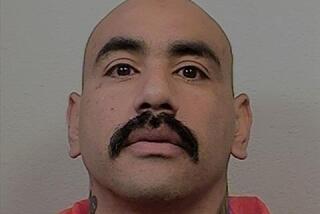Lindberg Found Guilty of Hate Crime, Murder
SANTA ANA — Deciding what is believed to be Orange County’s first capital case involving a hate crime, a jury Tuesday convicted a 24-year-old leader of a fledgling white supremacist gang of fatally stabbing a Vietnamese American college student.
The Superior Court jury deliberated two days before convicting Gunner Lindberg of murder during a robbery and while committing a hate crime--charges that make him liable to the death penalty.
The verdict sends an important message at a time when hate crimes nationally against Asian Pacific Americans are on the rise, experts said. Earlier this year, the Asian Pacific American Legal Center of Southern California released a report showing hate-crimes against Asians increased 17% nationwide in 1996 compared to 1995.
“I think the conviction is going to act as a deterrent,” Rusty Kennedy, director of the county’s Human Relations Commission, said Tuesday. “People need to know that they will pay the consequences if they commit hate crimes. That’s an important message to send out.”
The jury of nine women and three men rejected the defense’s argument that the prosecution did not prove its case, and will return to court Thursday to decide whether the Tustin man should be executed or sentenced to life in prison without parole.
Lindberg showed no emotion as the verdict was read, only glancing at the judge and then the jury. As he has on each day of the trial, the dark-haired, tattooed man wore a faded, blue-and-white Dallas Cowboys jersey.
For some, the jersey held a chilling significance: The Cowboys won the 1996 Super Bowl on the day of the murder.
That evening, 22-year-old Thien Minh Ly was practicing in-line skating on an unlit tennis court near his parents’ Tustin home when Lindberg and a friend, Domenic M. Christopher, tried to rob him.
When they learned he had nothing of value, Lindberg stabbed the victim more than 50 times and slashed his throat.
In a graphic letter written to a cousin shortly after the killing, Lindberg bragged that he “killed a Jap.” The letter would later become a key part of the prosecution’s case.
Additional evidence presented at trial by prosecutor Debbie Lloyd included a blood-stained black leather glove found in Lindberg’s bedroom. DNA testing showed it was stained with blood consistent with Ly’s.
Defense attorney David Zimmerman did not dispute that Lindberg played a role in the murder. But he argued that the evidence did not show the motive was robbery or racism.
The defense also raised questions about the credibility of the prosecution’s witnesses. During opening statements, Zimmerman hinted that he would try to shift some of the blame to Christopher, but that theory was not developed at trial.
Christopher, 17 at the time of the murder, was tried and convicted as an adult and was sentenced to 25 years to life in prison for his participation in the killing.
Ly’s mother, Dao Huynh, said outside court that she is satisfied with the verdict against Lindberg but that it won’t bring back her son, a high achiever who once composed a poem for her.
“It has been very, very painful,” Huynh said of the trial. Ly graduated in the top 10 of his class at Tustin High School, then he went on to earn a bachelor’s degree in biology and English at UCLA and a master’s degree in physiology and biophysics at Georgetown University in Washington, D.C.
At the time of his death, Ly was home vacationing before pursuing other graduate studies.
While at UCLA, he was president of the university’s Vietnamese Students Assn. and worked to improve conditions at refugee camps in Southeast Asia.
Lindberg’s hatred of Asians and other ethnic groups began after he was ousted for alleged misconduct from a military base in Japan, where his stepfather was stationed, witnesses said at trial.
Witnesses also told jurors about the Insane Criminal Posse, a white supremacist gang led by Lindberg, who kept a Nazi helmet with a swastika by his bed.
Investigators also found a poster of slain civil rights activist Martin Luther King Jr. with a message that read: “If they would’ve shot four more we could’ve had the whole week off,” in Lindberg’s bedroom.
The defendant is also suspected of twice attacking a Vietnamese American inmate in Orange County Jail, prosecutors said.
According to trial testimony, Lindberg may also have tried to orchestrate the attempted murder of his cousin, Walter Dulaney IV, who testified against him at trial.
Dulaney told jurors that shortly after he agreed to help the prosecution he was shot and injured by a man who shouted, “You want to put your cousin on death row? Here’s death row.”
No charges have been filed in either incident.
Tuesday’s conviction was lauded by those who monitor hate crimes, which are tough to prosecute.
“It’s a motive that’s in a person’s mind,” Kennedy said.
“Unless there are witnesses willing to come forward or, in [Lindberg’s] case, letters he had written, how do you prove that? It’s very difficult and that’s why a lot of hate crimes go unprosecuted.”
More to Read
Sign up for Essential California
The most important California stories and recommendations in your inbox every morning.
You may occasionally receive promotional content from the Los Angeles Times.










